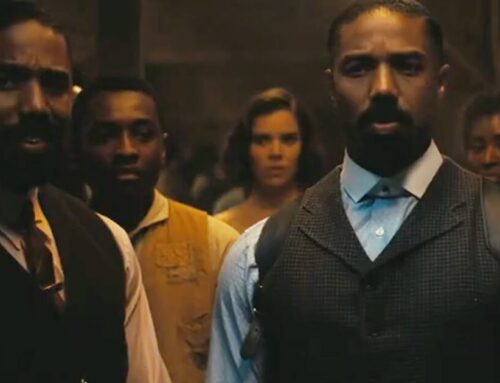Many movies reveal their secrets within the first five minutes, and it’s not until the end that we understand what we have already seen– and know. When that moment comes in ARRIVAL, it’s like a tsunami in slow motion. ARRIVAL spills its secrets softly in a grand, goosebump-inducing sci-fi adventure that made me feel like I was tumbling through space and time.
Based on an award-winning novella called “Story of Your Life” by Ted Chiang, the film begins quietly, the camera gliding from the dark into the light, slowly emerging on a serene lake in half light, viewed from a terrace. There’s a soothing v/o narration that begins with the words: “I used to think this was the beginning of your story…” Thus our course and that of the speaker is charted. The voice belongs to Louise Banks, one of the world’s great linguists called upon to decode the language of extra-terrestrials who have just landed all over the earth. As she translates this language, she herself is transformed in an extraordinary way that will help her come to grips with a personal tragedy, and arrive at a new understanding of the nature of time, free will, and the universe.
Amy Adams’s smart and powerfully emotive performance tethers us to the linguist’s mind-blowing experience. Her cohort on this journey of discovery is foremost theoretical physicist Ian Donnelly played by Jeremy Renner with subtle humor and warmth. He dubs the pair of aliens who mirror them “Abbot and Costello.” He is the science to her art, and the art to her science as they decipher the mysteries of this language, used by the extraterrestrials called “heptapods” for their seven-legged appearance. The “heptopods” have arrived in a series of saucer-shaped pods; but unlike the “flying saucers” we’ve seen on film before, let’s say in “Close Encounters of the Third Kind” (whose intensely emotional yet measured tone “Arrival” echoes), these saucers are delicately balanced on their edges, vertically. This shift in orientation suggests a world of difference; their egg-like appearance suggests fertile possibilities.
The film meticulously calibrated by director Denis Villeneuve (“Prisoners,” “Sicario”), stunningly orchestrated by his Oscar-nominated collaborator Johann Johannsson (“Sicario,” “The Theory of Everything”) and penned by horror meister Eric Heisserer (“Lights Out,” “Final Destination 5,” “The Thing”) never loses its cool. ARRIVAL quietly gathers intensity and builds to a pulse-pounding race against time, beginning with the Louise and Ian suiting up and slowly approaching these beings through a birth-canal-like tunnel. As sweat beads up on their faces and their breathing grows shallower, I could barely move my own lungs. They arrive at a clear membrane separating their respective atmospheres, but through which each duo mirrors the other, attempting to communicate. These scenes are startlingly poignant and symbolically loaded; in the course of the film we will come to understand this foursome as a palindrome across time, and how very close, indeed is their encounter.
The written heptapod language is beautiful: dark circles, thickened and furled with fractal-like curlicues, a rorschach ripe for the un-riddlers, and with as much to say about the writers as the interpreters. Their language, like all languages, is a map of how its users think and feel. If questions are “hammers” the answers must be “nails.” So how do we leap over the limits of the biases inherent in any language in order to truly understand another symbol system? How do we adopt a point of view with no familiar reference point? And how do we even begin if our natural reaction to “the other” is defensiveness and fear?
It’s a heady and particularly relevant point in our own country’s recent history, and highlights the challenge for the linguist and the physicist here who must increasingly fend off the politicians’ and the military’s need for speed and action. But no one is demonized. Army Colonel Weber who is leading the charge on the ground is sympathetically played by an almost noble Forest Whitaker, his colonel one of many good men reluctantly trapped within a system they feel they can’t get beyond. As fear sets in, pressure for definitive answers trumps the time needed for interpretation, nuance, and accuracy. Was that word the aliens used “weapon” or “tool”? Therein lies the literal double-edged sword, and it’s a life and death distinction for ALL parties concerned.
As the action builds, another internal narrative is unfolding: Louise is flashing back on painful memories of her daughter–or is she? Is she so deeply immersed in the extraterrestrial language she’s studying, that it is impinging on her dreams? Are these beings taking over her reality? Remember the beginning of the film and those opening words; know that the structure and content of the movie itself is a metaphor for an internal and external adventure that will explode your consciousness and your heart. Even if you can’t immediately answer all of its questions (and this film does a pretty good job of leaving no loose ends) the movie makes deep intuitive sense. From first scene to last, the film leads you from darkness into light, on a continuous journey of life and death, where communication is key to an ever widening horizon, a journey both strange and familiar; you’ll know when you’ve arrived.






Leave A Comment
You must be logged in to post a comment.